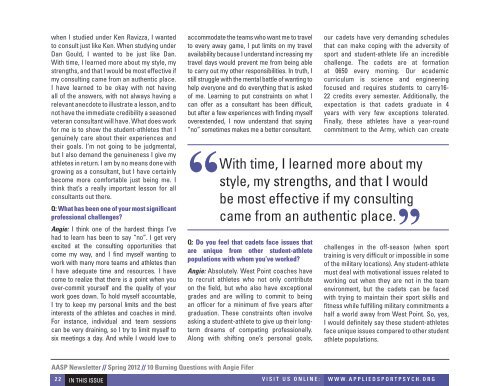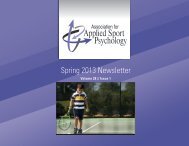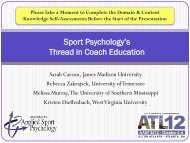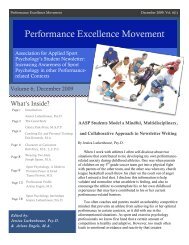Spring 2012 Newsletter - Association for Applied Sport Psychology
Spring 2012 Newsletter - Association for Applied Sport Psychology
Spring 2012 Newsletter - Association for Applied Sport Psychology
Create successful ePaper yourself
Turn your PDF publications into a flip-book with our unique Google optimized e-Paper software.
when I studied under Ken Ravizza, I wanted<br />
to consult just like Ken. When studying under<br />
Dan Gould, I wanted to be just like Dan.<br />
With time, I learned more about my style, my<br />
strengths, and that I would be most effective if<br />
my consulting came from an authentic place.<br />
I have learned to be okay with not having<br />
all of the answers, with not always having a<br />
relevant anecdote to illustrate a lesson, and to<br />
not have the immediate credibility a seasoned<br />
veteran consultant will have. What does work<br />
<strong>for</strong> me is to show the student-athletes that I<br />
genuinely care about their experiences and<br />
their goals. I’m not going to be judgmental,<br />
but I also demand the genuineness I give my<br />
athletes in return. I am by no means done with<br />
growing as a consultant, but I have certainly<br />
become more com<strong>for</strong>table just being me. I<br />
think that’s a really important lesson <strong>for</strong> all<br />
consultants out there.<br />
Q: What has been one of your most significant<br />
professional challenges<br />
Angie: I think one of the hardest things I’ve<br />
had to learn has been to say “no”. I get very<br />
excited at the consulting opportunities that<br />
come my way, and I find myself wanting to<br />
work with many more teams and athletes than<br />
I have adequate time and resources. I have<br />
come to realize that there is a point when you<br />
over-commit yourself and the quality of your<br />
work goes down. To hold myself accountable,<br />
I try to keep my personal limits and the best<br />
interests of the athletes and coaches in mind.<br />
For instance, individual and team sessions<br />
can be very draining, so I try to limit myself to<br />
six meetings a day. And while I would love to<br />
accommodate the teams who want me to travel<br />
to every away game, I put limits on my travel<br />
availability because I understand increasing my<br />
travel days would prevent me from being able<br />
to carry out my other responsibilities. In truth, I<br />
still struggle with the mental battle of wanting to<br />
help everyone and do everything that is asked<br />
of me. Learning to put constraints on what I<br />
can offer as a consultant has been difficult,<br />
but after a few experiences with finding myself<br />
overextended, I now understand that saying<br />
“no” sometimes makes me a better consultant.<br />
our cadets have very demanding schedules<br />
that can make coping with the adversity of<br />
sport and student-athlete life an incredible<br />
challenge. The cadets are at <strong>for</strong>mation<br />
at 0650 every morning. Our academic<br />
curriculum is science and engineering<br />
focused and requires students to carry16-<br />
22 credits every semester. Additionally, the<br />
expectation is that cadets graduate in 4<br />
years with very few exceptions tolerated.<br />
Finally, these athletes have a year-round<br />
commitment to the Army, which can create<br />
With time, I learned more about my<br />
style, my strengths, and that I would<br />
be most effective if my consulting<br />
came from an authentic place.<br />
Q: Do you feel that cadets face issues that<br />
are unique from other student-athlete<br />
populations with whom you’ve worked<br />
Angie: Absolutely. West Point coaches have<br />
to recruit athletes who not only contribute<br />
on the field, but who also have exceptional<br />
grades and are willing to commit to being<br />
an officer <strong>for</strong> a minimum of five years after<br />
graduation. These constraints often involve<br />
asking a student-athlete to give up their longterm<br />
dreams of competing professionally.<br />
Along with shifting one’s personal goals,<br />
challenges in the off-season (when sport<br />
training is very difficult or impossible in some<br />
of the military locations). Any student-athlete<br />
must deal with motivational issues related to<br />
working out when they are not in the team<br />
environment, but the cadets can be faced<br />
with trying to maintain their sport skills and<br />
fitness while fulfilling military commitments a<br />
half a world away from West Point. So, yes,<br />
I would definitely say these student-athletes<br />
face unique issues compared to other student<br />
athlete populations.<br />
AASP <strong>Newsletter</strong> // <strong>Spring</strong> <strong>2012</strong> // 10 Burning Questions with Angie Fifer<br />
22 In This Issue<br />
Visit us Online:<br />
www.appliedsportpsych.org






